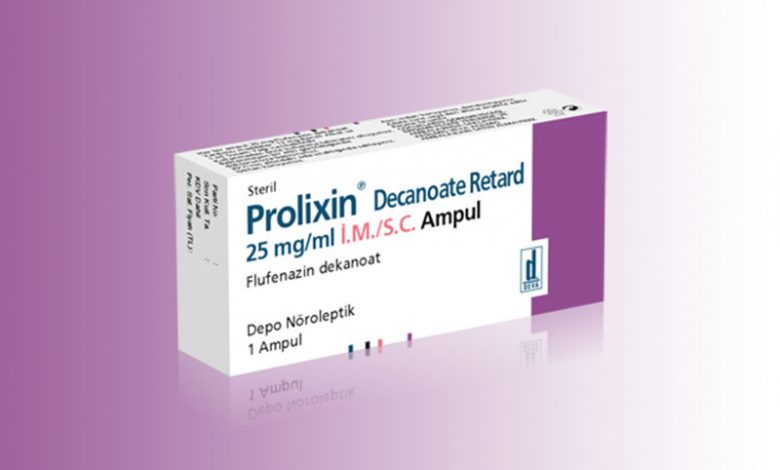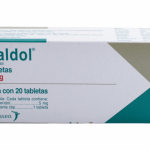Fluphenazine (Prolixin): Classification, Indications, Dosage, Side Effects

What Is Fluphenazine And What Does It Treat?
Fluphenazine (Prolixin), is a phenothiazine derivative and was one of the first drugs to be classed as an ‘antipsychotic’ after being approved by the FDA in 1959. In Britain, it was first used for the relief of anxiety. The American reports, however, were the first to indicate its value in psychotic illness.
Fluphenazine (Prolixin) has trifluoromethyl and piperazine groups which bring about an increase in potency that in many pharmacodynamic properties may be about 40 times as potent as chlorpromazine.
Fluphenazine (Prolixin) is approved for the treatment of schizophrenia. It is also known as a first-generation antipsychotic (FGA) or typical antipsychotic. Fluphenazine (Prolixin) rebalances dopamine to improve thinking, mood, and behavior.
Fluphenazine (Prolixin) may also be helpful when prescribed “off-label” for other mental health conditions. “Off-label” means that it has not been approved by the Food and Drug Administration for this condition. Your mental health provider should justify his or her thinking in recommending an “off-label” treatment. They should be clear about the limits of the research around that medication and if there are any other options.
What Is The Most Important Information I Should Know About Fluphenazine (Prolixin)?
Schizophrenia requires long-term treatment. Do not stop taking fluphenazine, even when you feel better.
With input from you, your health care provider will assess how long you will need to take the medicine.
Missing doses of fluphenazine may increase your risk for a relapse in your symptoms.
Do not stop taking fluphenazine or change your dose without talking to your healthcare provider first.
For fluphenazine to work properly, the tablet form should be taken every day as ordered by your healthcare provider. The long-acting injectable form should be received every 2-3 weeks as ordered by your healthcare provider. It is the same medication as in tablet form.
What Should I Discuss With My Healthcare Provider Before Taking Fluphenazine (Prolixin)?
• Symptoms of your condition that bother you the most
• If you have thoughts of suicide or harming yourself
• Medications you have taken in the past for your condition, whether they were effective or caused any adverse effects
• If you ever had muscle stiffness, shaking, tardive dyskinesia, neuroleptic malignant syndrome, or weight gain caused by a medication
• If you experience side effects from your medications, discuss them with your provider. Some side effects may pass with time, but others may require changes in the medication.
• Any psychiatric or medical problems you have, such as heart rhythm problems, long QT syndrome, heart attacks, diabetes, high cholesterol, or seizures
• If you have a family history of diabetes or heart disease
• All other medications you are currently taking (including over the counter products, herbal and nutritional supplements) and any medication allergies you have
• Other non-medication treatments you are receiving, such as talk therapy or substance abuse treatment. Your provider can explain how these different treatments work with the medication.
• If you are pregnant, plan to become pregnant, or are breast-feeding
• If you smoke, drink alcohol, or use illegal drugs
How Should I Take Fluphenazine (Prolixin)?
Fluphenazine (Prolixin) is usually taken once or twice daily with or without food.
Typically, patients begin at a low dose of medicine and the dose is increased slowly over several weeks.
The dose usually ranges from 2.5 mg to 10 mg. The dose of the long-acting injection ranges from 12.5 mg to 37.5 mg every 2-3 weeks. Only your healthcare provider can determine the correct dose for you.
Use a calendar, pillbox, alarm clock, or cell phone alert to help you remember to take your medication. You may also ask a family member or a friend to remind you or check in with you to be sure you are taking your medication.
The long-acting injection form of fluphenazine is administered every 2-3 weeks. Your healthcare provider will administer these injections. The medication effects last for approximately 2-3 weeks.
Fluphenazine (Prolixin) liquid suspension should be measured with a dosing spoon or oral syringe, which you can get from your pharmacy.
What Happens If I Miss A Dose Of Fluphenazine (Prolixin)?
If you miss a dose of fluphenazine, take it as soon as you remember, unless it is closer to the time of your next dose. Discuss this with your healthcare provider. Do not double your next dose or take more than what is prescribed. If you miss a dose of fluphenazine long-acting injection, see your healthcare provider to receive your dose as soon as possible.
What Should I Avoid While Taking Fluphenazine (Prolixin)?
Avoid drinking alcohol or using illegal drugs while you are taking fluphenazine. They may decrease the benefits (e.g. worsen your confusion) and increase adverse effects (e.g. sedation) of the medication.
What Happens If I Overdose With Fluphenazine (Prolixin)?
If an overdose occurs, call your doctor or 911. You may need urgent medical care. You may also contact the poison control center at 1-800-222-1222. A specific treatment to reverse the effects of fluphenazine does not exist.
Can a pregnant woman take Fluphenazine (Prolixin)?
If you are planning on becoming pregnant, notify your healthcare provider to best manage your medications. People living with schizophrenia who wish to become pregnant face important decisions. This is a complex decision since untreated schizophrenia has risks to the fetus, as well as the mother. It is important to discuss the risks and benefits of treatment with your doctor and caregivers.
Antipsychotic use during the third trimester of pregnancy has a risk for abnormal muscle movements (extrapyramidal symptoms [EPS]) and/or withdrawal symptoms in newborns following delivery. Symptoms in the newborn may include agitation, feeding disorder, hypertonia, hypotonia, respiratory distress, somnolence, and tremor; these effects may be self-limiting or require hospitalization.
Can a breastfeeding woman take Fluphenazine (Prolixin)?
No, breastfeeding is not recommended while taking fluphenazine (Prolixin). Studies suggest that small amounts of the drug pass into breast milk with doses of 1-5 mg a day (therapeutic doses). If you are taking fluphenazine (Prolixin) while breastfeeding, the baby should be monitored for more sleepiness than usual.
How Long Does It Take For Fluphenazine (Prolixin) To Work?
It is very important to tell your doctor how you feel things are going during the first few weeks after you start taking fluphenazine. It will probably take several weeks to see big enough changes in your symptoms to decide if fluphenazine is the right medication for you. If you take the fluphenazine long-acting injection, it will take a few days before fluphenazine is fully absorbed and at an adequate level to begin treating your symptoms. After starting fluphenazine long-acting injection for the first time, or re-starting after a time of no medication, your provider may also have you take fluphenazine tablets for a few days.
Antipsychotic treatment is generally needed lifelong for persons with schizophrenia. Your doctor can best discuss the duration of treatment you need based on your symptoms and illness.
• Hallucinations, disorganized thinking, and delusions may improve in the first 1-2 weeks
• Sometimes these symptoms do not completely go away
• Motivation and desire to be around other people can take at least 1-2 weeks to improve
• Symptoms continue to get better the longer you take fluphenazine
• It may take 2-3 months before you get the full benefit of fluphenazine
What Are The Possible Side Effects Of Fluphenazine (Prolixin)?
Side effects from Fluphenazine (Prolixin) are common:
• changes in appetite or weight
• dry mouth
• excitement or anxiety
• insomnia
• nightmares
• skin more sensitive to sunlight than usual
• upset stomach
• weakness or tiredness
Tell your doctor if any of these symptoms are severe or do not go away:
• blurred vision
• changes in sex drive or ability
• constipation
• difficulty urinating
• dizziness, feeling unsteady, or having trouble keeping your balance
• excessive sweating
• frequent urination
If you experience any of the following symptoms, call your doctor immediately:
• difficulty breathing or swallowing
• falling
• fever, chills, sore throat, or flu-like symptoms
• irregular heartbeat
• jaw, neck, and back muscle spasms
• persistent fine tremor or inability to sit still
• severe skin rash
• shuffling walk
• slow or difficult speech
• yellowing of the skin or eyes
If you experience a serious side effect, you or your doctor may send a report to the Food and Drug Administration’s (FDA) MedWatch Adverse Event Reporting program online (http://www.fda.gov/Safety/MedWatch) or by phone (1-800-332-1088).
Is Fluphenazine (Prolixin) a safe medication?
This medicine is safe when used as prescribed. However, fluphenazine (Prolixin) may increase the blood levels of a hormone called prolactin. Side effects of increased prolactin levels include females losing their period, production of breast milk, and males losing their sex drive or possibly experiencing erectile problems. Long-term (months or years) elevated prolactin can lead to osteoporosis or increased risk of bone fractures.
Some people may develop muscle-related side effects while taking fluphenazine. The technical terms for these are “extrapyramidal symptoms” (EPS) and “tardive dyskinesia” (TD). Symptoms of EPS include restlessness, tremor, and stiffness. TD symptoms include slow or jerky movements that one cannot control, often starting in the mouth with tongue rolling or chewing movements.
Temperature regulation: Impaired core body temperature regulation may occur; caution with strenuous exercise, heat exposure, and dehydration.
All antipsychotics have been associated with the risk of sudden cardiac death due to an arrhythmia (irregular heartbeat). To minimize this risk, antipsychotic medications should be used in the smallest effective dose when the benefits outweigh the risks. Your doctor may order an EKG to monitor for an irregular heartbeat.
Neuroleptic malignant syndrome is a rare, life-threatening adverse effect of antipsychotics that occurs in <1% of patients. Symptoms include confusion, fever, extreme muscle stiffness, and sweating. If any of these symptoms occur, contact your healthcare provider immediately.
All antipsychotics can cause sedation, dizziness, or orthostatic hypotension (a drop in blood pressure when standing up from sitting or lying down). These side effects may lead to falls which could cause bone fractures or other injuries. This risk is higher for people with conditions or other medications that could worsen these effects. If falls or any of these symptoms occur, contact your healthcare provider.
Are There Any Risks For Taking Fluphenazine (Prolixin) For Long Periods Of Time?
Tardive dyskinesia (TD) is a side effect that develops with prolonged use of antipsychotics. If you develop symptoms of TD, such as grimacing, sucking, smacking of lips, or other movements that you cannot control, contact your healthcare provider immediately. All patients taking either first or second-generation antipsychotics should have an Abnormal Involuntary Movement Scale (AIMS) completed regularly by their healthcare provider to monitor for TD.
What Other Medications May Interact With Fluphenazine (Prolixin)?
Fluphenazine (Prolixin) may block the effects of agents used to treat Parkinson’s disease such as levodopa/carbidopa (Sinemet®), bromocriptine, pramipexole (Mirapex®), ropinirole (Requip®), and others.
Fluphenazine (Prolixin) may lower your blood pressure. Medications used to lower blood pressure may increase this effect and increase your risk of falling. Propranolol (Inderal®) is an example of this type of medication.
The following medications may increase the risk of heart problems when used with fluphenazine:
• Antipsychotics including chlorpromazine (Thorazine®), thioridazine (Mellaril®), iloperidone (Fanapt®), paliperidone (Invega®), pimozide (Orap®), quetiapine (Seroquel®), and ziprasidone (Geodon®).
• Antiarrhythmics (heart rhythm medications) including procainamide, quinidine, amiodarone (Cordarone®), dronedarone (Multaq®), and sotalol (Betapace®).
Metoclopramide (Reglan®) may increase the risk of EPS or TD when used in combination with fluphenazine.
The following medications may increase the levels and effects of fluphenazine: bupropion (Wellbutrin®) fluoxetine (Prozac®), duloxetine (Cymbalta®), and paroxetine (Paxil®).





